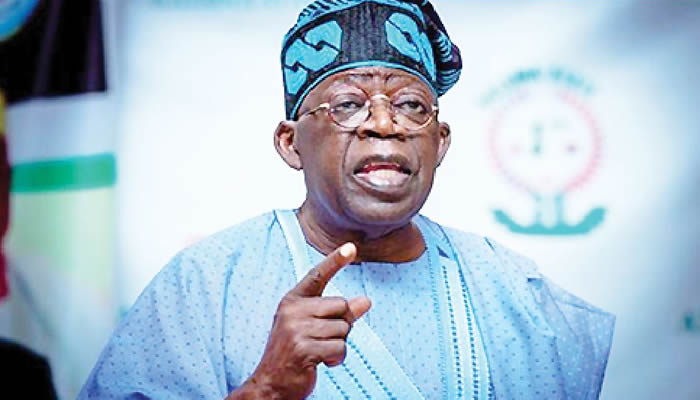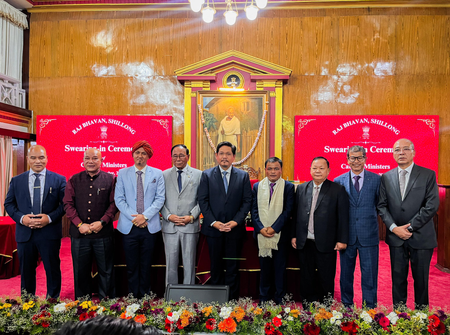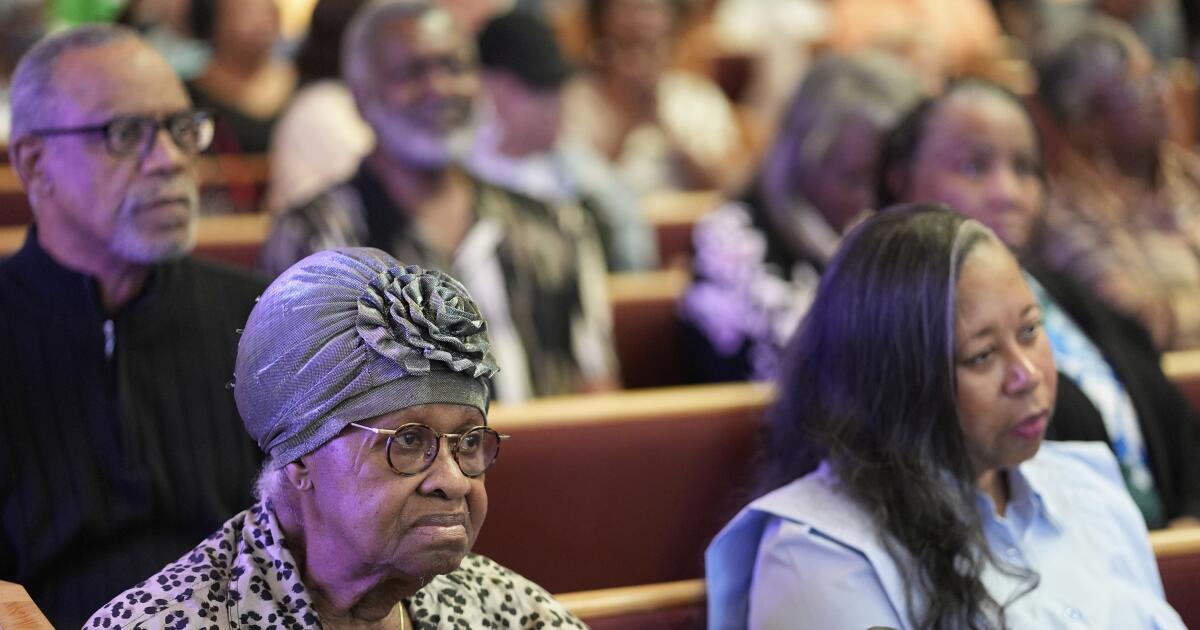By Innocent Oweh Joy Anigbogu,Our Correspondents
Copyright independent

…Says He Would Have Failed If He Didn’t Take Action…Warns Govs, State Assemblies To Work Together…Emergency Rule Has Set Rivers Back, Okaba, Onovo Lament…Tinubu Should Call Wike To Order Over Rivers — Lawson…Ugwumadu Asks Fubara To Show Courage, Determination
President Bola Tinubu, on Wednesday, lifted the state of emergency declared in Rivers State on March 18, 2025, seizing the opportunity to respond to critics who opposed his decision.
Tinubu in a personally worded statement he entitled, ‘Cessation of State of Emergency in Rivers State’, said he was not oblivious of criticisms that trailed his actions.
The president said despite pending court cases on the Rivers emergency rule, the constitution duly empowers him to act when a breakdown of law and order is under threat.
“I am not unaware that there were a few voices of dissent against the proclamation, which led to their instituting over 40 cases in the courts in Abuja, Port Harcourt, and Yenagoa, to inval-idate the declaration. That is the way it should be in a democratic setting.
“Some cases are still pending in the courts as of today. But what needs to be said is that the power to declare a state of emergency is an inbuilt constitutional tool to address situations of actual or threatened breakdown of public order and public safety, which require extraordinary measures to return the state to peace, order and security.
“Considered objectively, we had reached that situation of total breakdown of public order and public safety in Rivers State, as shown in the judgment of the Supreme Court on the disputes between the executive and the legislative arm of Rivers State. It would have been a colossal fail-ure on my part as president not to have made that proclamation,” Tinubu stated.
In lifting the emergency rule, Tinubu directed the governor, Siminalayi Fubara, the deputy governor, Ngozi Nma Odu, and members of the Rivers State House of Assembly and the Speaker, Martins Amaewhule, to resume work in their offices from today.
Recall that Tinubu pulled a surprising stunt when on March 18, 2025, he declared a state of emergency in the oil rich state, citing irreconcilable differences among the political actors, espe-cially between Governor Simi-nalayi Fubara and the current Minister of the Federal Capital Territory, Nyesom Wike.
While the political intrigues lasted, the Rivers State House of Assembly secretariat got destroyed overnight while two factions emerged battling for su-premacy.
Also justifying his actions, Tinubu said the destruction of crit-ical economic assets of the state, including oil pipelines as well as the crisis rocking the state House of Assembly necessitated his dec-laration of a state of emergency.
Tinubu announced on Wednesday, “My Fellow country-men and, in particular, the good people of Rivers State.
“I am happy to address you to-day on the state of emergency dec-laration in Rivers State. You will recall that on 18th March, 2025, I proclaimed a state of emergency in the state. In my proclamation address, I highlighted the reasons for the declaration.
“The summary of it for context is that there was a total paralysis of governance in Riv-ers State, which had led to the governor of Rivers State and the House of Assembly being unable to work together. Critical econom-ic assets of the state, including oil pipelines, were being vandalised.
“The state House of Assembly was crisis-ridden, such that mem-bers of the House were divided into two groups. Four members worked with the governor, while 27 members opposed the gover-nor. The latter group supported the speaker. As a result, the gov-ernor could not present any Ap-propriation Bill to the House, to enable him to access funds to run Rivers State’s affairs.
“That serious constitutional impasse brought governance in the state to a standstill. Even the Supreme Court, in one of its judgments in a series of cases filed by the executive and the legisla-tive arms of Rivers State against each other, held that there was no government in Rivers State. My intervention and that of other well-meaning Nigerians to resolve the conflict proved abortive as both sides stuck rigidly to their po-sitions to the detriment of peace and development of the state.
“It therefore became painful-ly inevitable that to arrest the drift towards anarchy in Rivers State, I was obligated to invoke the powers conferred on me by Section 305 of the 1999 constitu-tion, as amended, to proclaim the state of emergency. The Offices of the Governor, Deputy Governor, and elected members of the state House of Assembly were sus-pended for six months in the first instance. The six months expire today, September 17th, 2025.
“I thank the National Assem-bly, which, after critically evaluat-ing the justification for the procla-mation, took steps immediately, as required by the constitution, to approve the declaration in the in-terest of peace and order in Rivers State. I also thank our traditional rulers and the good people of Riv-ers State for their support from the date of the declaration of the state of emergency until now”.
Tinubu however acknowl-edged that some dissenting voic-es criticised the proclamation of emergency rule he imposed on the state which spurred legal bottlenecks.
According to him, as a stake-holder in democratic governance, he believe that the need for a har-monious existence and relation-ship between the executive and the legislature is key to a success-ful government, whether at the state or national level.
He said citizens who voted leaders into power expect to reap the fruits of democracy. However, that expectation will remain un-realisable in an atmosphere of violence, anarchy, and insecurity borne by misguided political ac-tivism and Machiavellian manip-ulations among the stakeholders.
“I am happy today that, from the intelligence available to me, there is a groundswell of a new spirit of understanding, a robust readiness, and potent enthusiasm on the part of all the stakeholders in Rivers State for an immediate return to democratic governance. This is undoubtedly a welcome development for me and a re-markable achievement for us. I therefore do not see why the state of emergency should exist a day longer than the six months I had pronounced at the beginning of it.
“It therefore gives me great pleasure to declare that the emer-gency in Rivers State of Nigeria shall end with effect from mid-night today. The governor, His Ex-cellency Siminalayi Fubara; the deputy governor, Her Excellency Ngozi Nma Odu, and members of the Rivers State House of As-sembly and the speaker, Martins Amaewhule, will resume work in their offices from 18 September 2025.
“I take this opportunity to remind the governors and the Houses of Assembly of all the states of our country to continue to appreciate that it is only in an atmosphere of peace, order, and good government that we can de-liver the dividends of democracy to our people. I implore all of you to let this realisation drive your actions at all times”.
Fubara Urged To Be Courageous, Con-centrate On Mandate Given To Him
Meanwhile, as President Bola Tinubu ends emergency rule in Rivers State today, which he claimed happened as a result of total paralysis of governance in Rivers State, some Nigerians have reacted to the development.
Chief Martin Onovo a former presidential candidate, told Daily Independent that Fubara should concentrate on the mandate given to him by his people, saying that the setback was caused by Presi-dent Bola Tinubu.
“The problem of Nigeria is the leadership. This situation is created by the lawlessness of the Tinubu regime. The suspension of Fubara is unlawful. It is uncon-stitutional. So, when you create this kind of problem, other prob-lems start to emerge.
“What happened to him can happen to anybody and it hap-pens elsewhere. When there was a coup d’etat the government was overthrown.
“What happened to him was a coup d’etat. It can happen to me. It can happen to anybody.
“The position of the law is that the purpose of government is the security and welfare of the people. If Fubara comes back to office, he should attend to the se-curity and welfare of the people the best way he can.
“When he gets back there, he should think about the best ways to promote the security and the welfare of his people. If there is anything left there, or if there is nothing left, he will wait for the next federation account alloca-tion to have some more money, and use it on the welfare of his people, provide health services, infrastructure, education, and etcetera.
On his part, Prof. Benjamin Okaba, President of Ijaw Nation-al Congress lamented that the six months of emergence rule has re-sulted in unemployment, poverty and other forms of social vices in Rivers State.
He said that Governor Fubara should be encouraged and sup-ported to carry on with his duty and mandate given to him by the people.
Okaba, who spoke on Arise TV, said, “Six months of emergen-cy rule in River State, spanning from the 18th of March to 18th of September 2025, have actually resulted in very significant losses across multiple sectors. And these losses impact the short term, long term governance and democratic representation on the economy, on social services, on democratic consolidation.
“So, to start with, with the suspension of the governor, the deputy governor and the legisla-ture, we had in place some form of dictatorship, represented by the so-called appointed, and this in itself stripped the citizens of River State of elected representa-tion. Governance was centralised. From one table, decisions were made without any form of legis-lative input and therefore devoid of public accountability.
“And all of this has under-mined the very basis of democ-racy, which is the government of the people, by the people and for the people. The local autonomy, as seen, was also undermined because alongside the sole ad-ministrator being appointed at the head of the state, local gov-ernments also had administra-tors, I mean across the 25 local government areas, that in itself weakened grassroots democra-cy and accountability. In fact, in August 2025, local government elections were conducted. We all saw the criticisms about biases in favour of one individual who captured the 25 local government areas. This has also exacerbated perception of political capture. These are things we talked about before and during the declaration.
“Now, talking about invest-ment, there was also some kind of apathy to the extent that econom-ic activities were very low. There were reports that investors and businessmen received low patron-age because of the uncertainties. Now, there are two major projects that are ongoing.
“Talking about the N195 bil-lion Port Harcourt Ring Road project, Ring Road and the Trans-Kalabari Initiative. All of these were stalled and the impact for us is worsening transport hardship and decaying devel-opment. There were job losses, about 10,000 jobs lost as a result of political reasons.
“People were removed from offices and this increased unem-ployment and also created hard-ship. Port Harcourt was once known as the Garden City. During this period, it was very visible that the entire environment in Port Harcourt littered with all kinds of waste that actually degraded the social services because sani-tation services were not properly carried out.”
In Former President of Com-mittee for Defence of Human Rights (CDHR), Malachy Ugwu-madu, faulted Fubara for not be-ing decisive, which, according to him, compounded his problem.
He said, “Fubara has the ben-efit of this experience. He should know that it doesn’t pay to suffer indecision when you have to be very resolute and decisive. Be-cause that’s how he boxed him-self into a very terrible situation that makes him very weak.
“And history, unfortunately for him, has recorded him and will document him as such. Secondly, as a people, we must learn how to ensure that no singular person, however powerful, is allowed and permitted to control the movements of power. The white man who crafted the concept of democracy did it knowing that humanity is prone to abuse of power. What Rivers State has suf-fered is perhaps yet a new trend of weakness. Who didn’t just demo-bilise its own political party, but stood in the way of that party in preference for a different political party simply because he did not get what he was looking for.”
Femi Lawson, Executive Di-rector, Centre for Public Account-ability, noted that political actors must understand that peace in Rivers State is not negotiable.
He said, “Lessons must have been learnt by political actors in Rivers State, that ultimately peace is not negotiable. There must be peace, but most importantly the interest of people of Rivers State must be given priority other than political interest of individuals which led to the declaration of state of emergency. They must do everything possible to avoid what has happened in Rivers State, not only in Rivers State but in other states of the federation, even though there is still contes-tation about the legitimacy of the action of the president. It’s good that democratic governance has been restored in Rivers State.
“Fubara must focus on the responsibility of delivering the dividend of democracy to Rivers State and he mustn’t focus on who are his friends or enemies. He should focus on delivering on the mandate of the Rivers people.
“Wike should understand that he has been governor of that state. He’s no longer the governor and he should give Fubara the needed support and allow him to work, as governor of Rivers State with-out unnecessarily trying to dic-tate how governance in Rivers State should go even though, it’s presumed that he’s the political godfather of the governor, which is unknown to the law. He should allow Fubara to run Rivers State while he focuses on his duty as minister of the FCT. I call on the president to also call Mr. Wike and ask him to focus on his duty, as minister and leave the business of governance to Fubara.”



